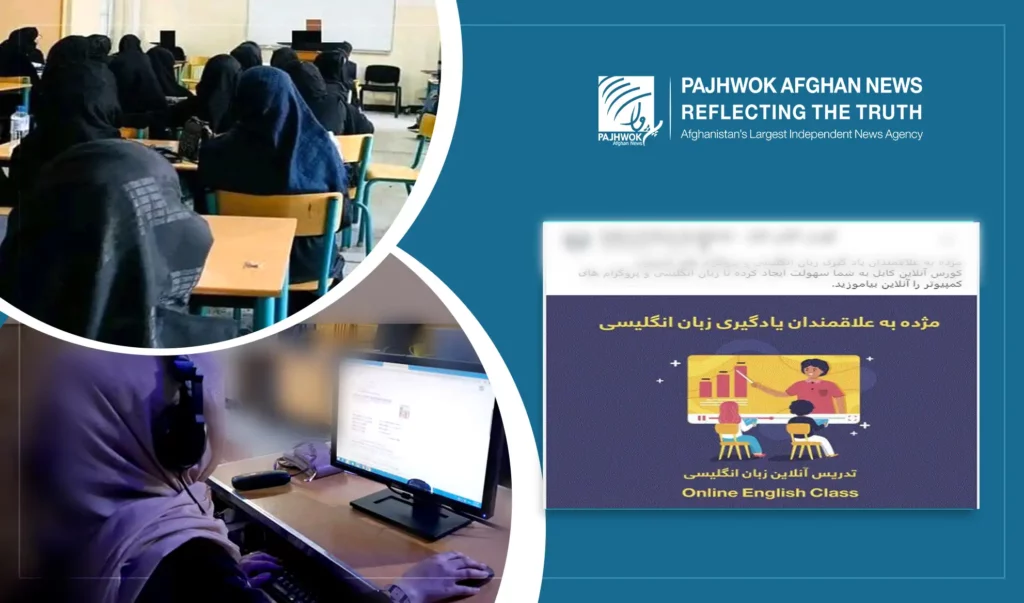KABUL (Pajhwok): Following the ban on girls’ high and university education, online courses for girls have been increasing, but students call online courses ineffective and no replacement to in person learning.
After the re-establishment of the Islamic Emirate in August, 2021, the caretaker government suspended schools for girls above 6th grade and then banned female students from going to universities until further notice.
Government officials have repeatedly emphasized they are not against the education of girls and girls will be allowed to go to educational centres under a new plan, but this promise remains unfulfilled.
Some institutions have started online training programs and currently thousands of girls are engaged in online training courses across the country.
Dozens of online training centres have been set up for girls in last two years.
Pajhwok Afghan News findings show over the past two years, 80 online education programs were established in Kabul and some provinces for girls, with some offering services free of cost and others charge fee.
These courses include learning different languages, school subjects, holy Quran, computer, etc. and some educational centres provide free online teaching to girls.
For example, “Afghanistan Azad University, and Women’s Online University” have attracted girls in various areas and teach them for free.”
However, monthly fee of these courses ranges from 500 to 3,000 afghanis, but the fee in educational centres is higher and it differs depending on subjects.
Students of online courses express different views
Sara Salehi, a second-year student at Kabul University’s Faculty of English Literature, told Pajhwok Afghan News that after girls were prevented from going to educational centres, she joined several online courses.
She added: “Online courses cannot replace in person learning and have their own problems.”
Currently, Sara is learning Arabic, Turkish and German languages online in addition to learning English.
She said online courses were free and lessons were taught through WhatsApp.
But Hajreh, a resident of Kabul who is enrolled in one of online training courses, says: “I participated in online courses for two nights, but it has not been useful, no one learns anything and the internet usage is very high.”
She urged the Islamic Emirate to open the doors of schools and universities to girls as soon as possible.
Online courses to have dangerous consequences in long-term: Experts
Javid Momand, teacher at one of the Higher Education Institute, said: “When the Islamic Emirate of Afghanistan (IEA) took power a portion of the society — women and girls— were deprived of education therefore some institutions, universities and academies have started online education to compensate the deprivation of girls from education.”
He said: “It is possible that some institutions may seek to get advantage by getting funds from foreign organisations and implementing their projects, if online courses are aimed at getting profit it would not produce the required result.”
He, however, said that never online education could replace education in person because the later has its own impact.
He said: “Afghanistan is a poor and backward country, there are many problems in the field of online courses one of those problems is the Internet. There are many students who do not have money to pay their bus fare, there are many families who do not have money for their bread, How can they pay for the Internet? There is electricity, economic, management problem, in my opinion, online courses do not give good results in third world and backward countries, but it can solve some problems in the short term.”
Farid Mohammad, a teacher at Kabul Education University, said recently it had been noticed that online courses are on the raise, adding that this programme could be effective in the short term but in the long term it could have a devastating impact on the country.
He said education in person has impact on taught and vision, student’s presence in the class created a competitive environment.
He, however, said in online education system student did not pay proper attention to their education, because they know that presence doesn’t matter, there is no attendance and there is no success and failure important.
Online courses founders
Rafai Kateb, head of the Payam-i-Noor Academy, said his academy provided online education in different areas, including foreign languages, mathematic and kankor preparation.
He said: “On of the reason why we started this is that we wanted to be beyond a limit, and our online service has given better results than face-to-face, and the second reason is to provide education for girls who are left out of school.”
He said in online classes over 500 students most of them boys and in in person classes more than 700 boys are getting education.
According to Kateb, their online education course duration is three month, six months and one year and 500 afs are taken from students each month as a fee.
Mohammad Daud Naikzad, the founder of Khana-i-Zaban English, said he run this academy from the past three years and most of his students are boys.
He said each semester fee is 1,000 afs, adding that after the Covid-19 virus outbreak and band on girls’ education he started online and used Google Meet application.
He said the purpose of his online course was to provide learning opportunity for girls.
sa/nh/ma








GET IN TOUCH
NEWSLETTER
SUGGEST A STORY
PAJHWOK MOBILE APP